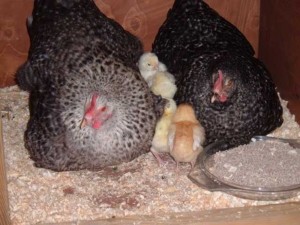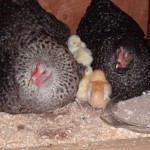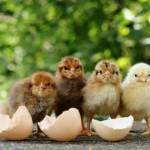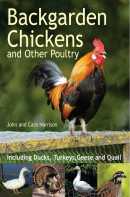This article is part one of a Brief Guide to Incubation, Hatching, Rearing & Sexing Chickens & Ducks.
How Many Chickens?
At this time of year many people will have broody hens refusing to move off the nest or you may be thinking about popping some eggs in the incubator. The first thing to consider when hatching is space. How many more birds can you accommodate? If you have a fixed run this is of course going to be more limited than those with free ranging birds, but those with free rangers need to remember more birds equals more mess and possible garden devastation!
What to do with Cockerels and Drakes?
 Once you have decided on how many you can hatch the all-important question of what will happen to your boys comes up. Will you be able to keep them, eat them, sell them or rehome them? Rehoming cockerels or selling them is hard, especially for cross breeds so although this is most peoples ideal you need to have a back up plan of either having enough space to keep them for an extended period or being able to cull them for the table. Remember cockerels can crow as young as 14 weeks and once one starts the rest of the hatch are not usually long to follow, which can annoy neighbours.
Once you have decided on how many you can hatch the all-important question of what will happen to your boys comes up. Will you be able to keep them, eat them, sell them or rehome them? Rehoming cockerels or selling them is hard, especially for cross breeds so although this is most peoples ideal you need to have a back up plan of either having enough space to keep them for an extended period or being able to cull them for the table. Remember cockerels can crow as young as 14 weeks and once one starts the rest of the hatch are not usually long to follow, which can annoy neighbours.
Broody Hen or Incubator?
If using a broody you are going to need to set up a broody coop and ideally a separation run for while the hatchlings are small. If incubating you will need your incubator and a brooding box, whether built for the purpose or a box with a heat lamp over it ready for when they hatch.
I much prefer popping eggs under a broody hen for ease of hatching and rearing, but have found my incubated and hand raised birds to be less flighty and with cockerels less aggressive so both methods have their advantages.
Poultry Incubation Problems
If using an incubator you should follow the maker’s instructions. If you have an unusual problem I can highly recommend popping into these poultry chat forums poultry information section where between all the poultry keepers pretty much every problem has been discussed and there is always plenty of advice for those who need it.
Trust Your Broody Hen
When using a broody to hatch trust their instincts. If they repeatedly kick and egg from the next it is most likely a dud. Some breeds make better mothers than others; Silkies, Pekins and Light Sussex are particularly good at sitting and mothering.
Incubating Ducks with a Broody Hen
With ducks you may have a little more difficulty. The Appleyard and the Cayuga are the better of the mother ducks and the Runner in particular tends to fail a full sit and in my experience have been known to abandon ducklings at hatch. The good thing is though that your broody hen will sit on duck eggs and raise them just as well as the best broody duck (although never the other way round – don’t place chicken eggs under a broody duck).
Candling Eggs
If candling eggs I would suggest looking at 7 and 14 days for development. If the eggs are duds remove them from the broody or incubator. If incubating you will need to be vigilant for unusual smells or any cracks in eggs and remove these straight away as an exploding egg will spoil the whole hatch.
Brief Guide to Incubation, Hatching, Rearing & Sexing Chickens & Ducks
Incubating Chickens & Ducks
Incubating Chickens & Ducks, Hatching, Sexing & Rearing
More Articles on Keeping Chickens
- 7 Important Things You Need To Take Care Of Chickens
- Chickens Illness & Problems
- Low Cost Hens – Finding Cheap Hens and Housing for them
- Starting Keeping Hens – A Basic Guide
- Chickens in Winter – The Garden
- Back Garden Chicken Keeping – Hens at Home in the Garden
- Low Cost Hens – Feeding Frugally
- Low Cost Chicken Coops – Budget Hen Houses
- Keeping Chickens on a Budget – Getting & Housing Your Hens
- Keeping Chickens on a Budget – Feeding, Watering & Protecting Your Hens
- Keeping Chickens Warm in Winter
- What to Feed Chickens in Winter
- Incubating Chickens & Ducks
- Keeping Chickens for Meat – Costs & Returns – The Economics
- Incubating Chickens & Ducks, Hatching, Sexing & Rearing
- Keeping Chickens for Meat, Table Birds Best Chicken Breeds
- Keeping Chickens for Meat – Raising & Feeding Table Birds




